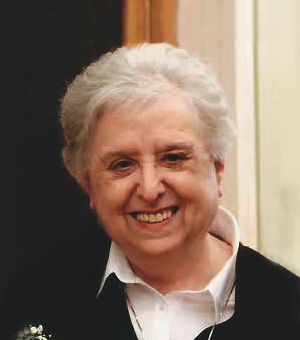When I arrived in Rome from Alba for my novitiate in 1954, I was placed for my three hours of daily apostolate in the so-called Centre. It was situated on the ground floor of the new Divine Master House, inaugurated in 1950. It was a large rectangular room, where the Sisters of the book centres and the propagandists were supervised, with suggestions, organizational and formation aids. Sr Assunta Bassi was the soul, helped by Sr Fatima Malloci and Sr Paola Honau. We, the young professed and novices: Cesarina Fra, Tarcisia Baltieri, Lucia Righettini, Daniela Baronchelli and myself, were the enthusiastic apprentices. On the first floor was the office of Maestra Thecla and Sr Ignazia Balla, the bursar; there was the chapel and the new Sala San Paolo, with a very rich library for the editorial.
What do I remember about Maestra Thecla? I do not remember any particular episodes during that time. But I do remember a deep feeling: I was aware of the affectionate relationship with her – she was there, close by, upstairs – and I felt, we felt, that she appreciated us, she loved us, she was happy with what was being done to help the branch Houses to progress in the apostolate. Maestra Assunta sometimes told us the details of what Primo Maestro suggested, of which Prima Maestra was happy: organising propaganda better (the vademecum was then created); to help the Sisters to be more informed and competent, we started to prepare review card- registers for book centres, the kardex file, etc.
At that time the book archive and warehouse were also located in the basement of the same house. Sometimes I would pass her in the hallway or on the stairs. I, the newcomer, felt proud to think that she was happy, that the apostolate was in her heart. And it took on more and more meaning in my heart too, no matter if my job was just checking invoices, leaning on the window sill.
As a professed Sister, I worked for about five years at Ut unum sint. At different times, some of us found ourselves in difficult working situations. More than once, with Sr Cristina Schreil, we confided our problems and uncertainties to her. She listened to us, we felt that she understood us; and she gave us some advice on how to act.
Each time she returned from her trips abroad, we welcomed her back on behalf of the community, and she would give us a brief information about the realities she had encountered. The things that had impressed her, the life and apostolate of the Sisters… everything was so beautiful for us – it was as if she were projecting a documentary to broaden our horizon.
I have a jovial, somewhat funny memory of her return from a trip to Japan. To greet her, together with some Japanese Sisters in our group, we invented a song in Japanese (!!!) that included the names of all the towns in the communities she had visited: Oedo nipponbasi nanadsudaci, adsunobori… the tone of the song was very cute. She listened and looked at us with wide-open eyes, wondering what we were singing about. At the end she laughed with pleasure… giving us great satisfaction.
Among the beautiful memories of my youth in the community in Rome is that of 18 March, the eve of Saint Joseph’s Day, the day on which we wished the Founder a happy feast day. One year, in 1959 to be precise, before giving a report on apostolic activities (propaganda initiatives, progress of the book centres, publications, catechetical movement, etc.), Maestra Assunta thanked the Founder the Founder for the gift of the Congregation, for the Pauline spirit, for the apostolate and “for having given us Prima Maestra”. At the mention of this name, a great applause broke out in the hall. And Don Alberione, smiling, but also making a gentle reminder, immediately said: “But treasure it!” And at the end of his talk, he further said: “I am happy that you have made an enthusiastic reference to Prima Maestra. Follow her always.
To lead, there is no need for many words, nor is there any need for much study, it is enough to possess the wisdom of God and to be enlightened by God.”
M Letizia Panzetti, fsp
